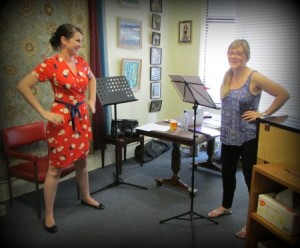Befriend your butterflies
 In nerve-wracking situations like performing, butterflies are a regular but unwelcome visitor. In my Stage Fright Workshop in October, presenter Amy Radford explained why it’s important to make butterflies your friend, not your foe.
In nerve-wracking situations like performing, butterflies are a regular but unwelcome visitor. In my Stage Fright Workshop in October, presenter Amy Radford explained why it’s important to make butterflies your friend, not your foe.
Thanks to evolution, we’re all wired to flee or fight when faced with a stressful event, which was handy back in Neanderthal days if a sabre-toothed tiger considered us for dinner.
These days we’re less likely to be in mortal danger on a regular basis, yet we still experience the fight or flight response when we feel threatened. Shakiness, intense butterfly activity, overthinking or self-doubt are some of the unpleasant side effects and it’s normal for us to send them packing…or at least try to!
Yet opera singer and peak performance coach Amy Radford says you need to feel some level of arousal and discomfort to perform at your best. At the Stage Fright Workshop on October 26, Amy encouraged participants to embrace and acknowledge the unpleasant feelings in an effort to strike a balance between arousal and comfort levels. In other words, it’s useful to feel slightly uncomfortable, so instead of trying to eliminate the feelings, acknowledge their presence and see them as a helpful guest.
Amy says a practical way to deal with performance nerves is to establish ‘process cues’, which involves identifying two things you want to get out of the performance. She suggests one technical cue, such as articulation or breathing, and one cognitive cue, such as telling a story through the song, enjoying the audience’s company or feeling the joy of singing. It is far more achievable to concentrate on two cues rather than trying to perfect twenty and means you’re less likely to be distracted by external factors such as a disinterested audience member.
 At the workshop, Tim liked the idea of using process cues to settle at the start of a performance. Rather than standing up and jumping into the song, he’ll now take time to scan his body and mentally name his chosen cues before taking his first breath.
At the workshop, Tim liked the idea of using process cues to settle at the start of a performance. Rather than standing up and jumping into the song, he’ll now take time to scan his body and mentally name his chosen cues before taking his first breath.
While Stephanie will use the cues to manage her expectations of a flawless performance. Amy taught the group that ‘perfection is improbable’ and if you try to exert conscious control over too many aspects of a performance, it hinders your ability, not to mention your enjoyment.
What process cues could you use in your next performance?
Share your thoughts with me via email or Facebook.
Kathleen Connell is a Sydney-based singing teacher and vocal coach who trains both aspiring and accomplished singers in technique and vocal skills. She is an active member of ANATS, a writer and PhD candidate at Griffith University.


